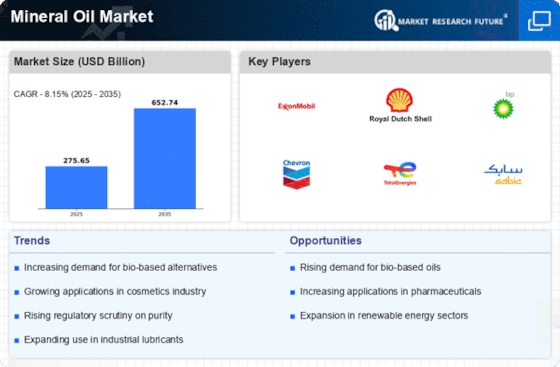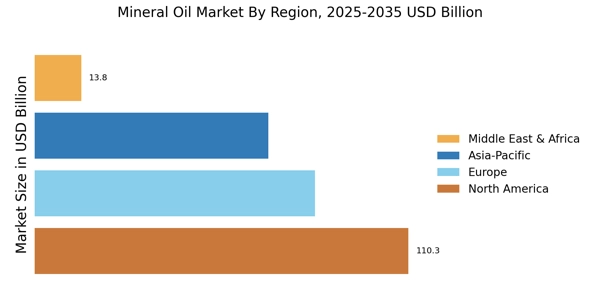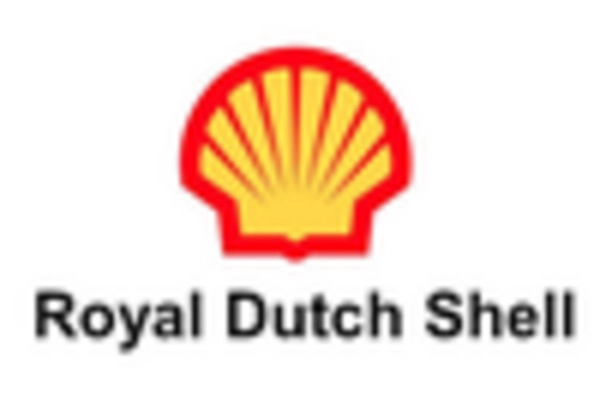Growth in Industrial Applications
The Mineral Oil Market is significantly influenced by the growth in industrial applications, particularly in sectors such as manufacturing and automotive. Mineral oil is widely used as a lubricant and coolant in machinery, which is essential for maintaining operational efficiency. The increasing industrial activities and the expansion of manufacturing facilities are expected to drive the demand for mineral oil in these applications. In 2025, the industrial segment is projected to account for approximately 25% of the total mineral oil consumption. This growth is indicative of the broader economic trends, where industrialization and infrastructure development are prioritized. As a result, the Mineral Oil Market may witness increased investments in production capabilities to meet the rising demand from various industrial sectors.
Rising Demand in Personal Care Products
The Mineral Oil Market experiences a notable surge in demand due to its extensive use in personal care products. Mineral oil serves as a key ingredient in moisturizers, lotions, and hair care products, providing hydration and enhancing texture. The increasing consumer awareness regarding skin health and the preference for products with natural ingredients contribute to this trend. In 2025, the personal care segment is projected to account for approximately 30% of the overall mineral oil consumption. This growth is driven by the rising disposable income and changing lifestyles, particularly in emerging markets, where consumers are increasingly investing in premium personal care items. As a result, manufacturers in the Mineral Oil Market are likely to innovate and expand their product lines to cater to this growing demand.
Expansion in Pharmaceutical Applications
The Mineral Oil Market is witnessing an expansion in its applications within the pharmaceutical sector. Mineral oil is utilized as a lubricant in various medicinal formulations and as a base for ointments and creams. The increasing prevalence of chronic diseases and the growing aging population are driving the demand for pharmaceutical products, which in turn boosts the mineral oil consumption. In 2025, the pharmaceutical segment is expected to represent around 20% of the total mineral oil market share. This trend suggests that pharmaceutical companies are increasingly recognizing the benefits of mineral oil, leading to enhanced product formulations. Consequently, the Mineral Oil Market is likely to see a rise in partnerships and collaborations between mineral oil suppliers and pharmaceutical manufacturers to meet the evolving needs of the healthcare sector.
Regulatory Support for Mineral Oil Usage
The Mineral Oil Market benefits from regulatory support that encourages the safe and effective use of mineral oil in various applications. Regulatory bodies are increasingly recognizing the importance of mineral oil in sectors such as food processing and cosmetics, leading to the establishment of guidelines that ensure product safety and quality. This regulatory framework is likely to enhance consumer confidence and promote the use of mineral oil-based products. In 2025, it is anticipated that the regulatory environment will continue to evolve, potentially leading to increased market opportunities for mineral oil suppliers. The Mineral Oil Market may see a rise in compliance-driven innovations, as manufacturers strive to meet regulatory standards while catering to consumer preferences for safe and effective products.
Technological Innovations in Production Processes
The Mineral Oil Market is poised for transformation through technological innovations in production processes. Advances in refining technologies and extraction methods are enhancing the efficiency and quality of mineral oil production. These innovations not only reduce production costs but also improve the environmental footprint of mineral oil manufacturing. In 2025, it is expected that companies adopting these technologies will gain a competitive edge in the market. The integration of automation and data analytics in production processes may lead to increased operational efficiency and product consistency. As a result, the Mineral Oil Market could experience a shift towards more sustainable practices, aligning with the growing consumer demand for environmentally friendly products.

















